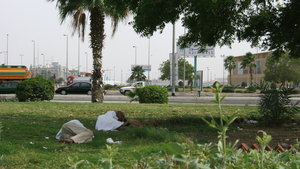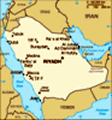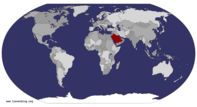Advertisement
Published: June 18th 2010

 Asleep in the shade
Asleep in the shade
Two Ajnabi take a break from their daily slog and knap under a tree. Grass is a luxury in the Kingdom and these two were clearly not gonna pass up the opportunity. This is on fact not as a rare a sight as might be assumed.Sakir was a deeply-tanned, well-built man in his mid-thirties, very much in the mould of the men I remember seeing everywhere in my father’s village in Bangladesh, only he was Indian. He had that wonderful Asian hairdo, where the hair is just left to grow into a huge mass on the head, styled only by a slight comb-over at the front and wonderfully complimented by a thick moustache that wouldn’t look out of place on the top lip of a Bollywood gangster. The ‘tache was also clearly something he took pride in, cultivating it regularly with a comb that he kept in the breast pocket of his faded beige shirt.
We became properly acquainted one night as I struggled to enter my Jeddahn accommodation carrying several heavy shopping bags; “Coffee?” asked Sakir in his strong Indian accent. I was so touched by this gesture that I instantly replied, “yes”. Clearly surprised by my enthusiasm, he immediately leapt up from the marble step he always sat and went to dash off and put the kettle on. I stopped him and signalled that I would join him after I had finished putting the shopping away.
The big iron gate with it’s

 Amir the Harris
Amir the Harris
My own harris during my residency in the Kingdom. A lovely old man who was working illegally in the country having arrived on a Hajj visa and decided to stay.bronze floral motifs was ajar. Inside I could hear Sakir rummaging around but the dim evening light left me unsure quite where. It is a serious social crime to simply step into the courtyard of a Saudi residency where any one of the womenfolk could be walking around uncovered, so instead I knocked on the plastic panel that covered the inside of the gate and waited. A moment later, Sakir’s wonderful big hair came around the gate proudly holding an ancient looking copper teapot.
“Come, come”, he said, pointing towards a small hut in the corner of the courtyard of the splendid looking house. Typical of this part of Jeddah, it was built in the style of a European villa - a simple yet functional design. The courtyard was vast and dimly lit by Arab lanterns that hung from the walls, which only emphasised the insignificance of Sakir’s humble abode sitting in the dark corner.
For the past week or so I had watched as this man sat day in day out on those marble steps with the obedience of a dog guarding his master’s property, springing to his feet the moment any one of his family arrived, whether to help with heavy loads or simply to open the heavy gates that led to the house. Whenever we had seen each other, his face had always broken into a tender smile that could not betray the loneliness and uncertainty in his eyes.
So sad is his existence in this wealthy suburb of Jeddah, that not one of the local residents even knew his name, referring only to him as the “harris’ from so and so house”. It was as if he had no identity beyond being the ‘keeper’ (the meaning of harris) of someone else’s home.
This had initially only bothered me a little, but the more I saw him, the more it began to really get beneath my skin. Although I had only just arrived in this strange land of wealth and indulgence I just didn’t see what was so different about him that meant others couldn’t treat him an equal - yes he was a foreigner, yes he was at the lower end of the employment scale and yes he was neither privileged nor wealthy, but looking through democratic western eyes, I simply did not see the grounds to demote him to an almost sub-human category like everyone else around me, and whilst I was in no a position to challenge this apparent social ‘norm’, I had decided quite early on that the first opportunity I get, I would not conform to it.
Sakir’s ‘home’ was half the size of any room I had been in until then. In one corner was his bed, which doubled as a ‘sofa’ for guests sitting directly opposite his only other friend in the room, a tiny box TV placed atop a disused bookshelf - both quite clearly ‘unwanted’ items from the house. Besides these, his only other belongings included the distressed looking wooden chair I sat on, and a small bedside table, which doubled up as his dining table. It was simple, maybe a little sad in this land of excess, and yet for some strange reason I felt more at home here than I had for a long, long time.
Sadly the fact that we had major language barriers meant, this was something I couldn’t communicate to Sakir, who kept smiling at me nervously as he waited for the teapot to boil on the small camping stove he used as a cooker. I did my best to give him a re-assuring smile back in case he might feel I was disappointed by what he had to offer; after all I came from a background, where the large majority of people still live in similar conditions to this day in Bangladesh. This was nothing new to me, and I have been comfortable with a lot less.
Little did I know that in fact Sakir was doing rather well for a ‘Harris’ compared to some of the despicable and meagre residencies other keepers’ were offered. At the time though, I made every effort to ensure he knew I was content and happy to be a guest in his ‘home’. To emphasise this I asked if I could sit on the bed, closer to the ground and nearer to him. At this, he again produced that wonderful smile of his displaying his clean set of white teeth, only slightly stained by nicotine from the cigarettes that stayed with in his trusty breast pocket.
For a while we sat in silence as we waited for the kettle to boil; it wasn’t an uncomfortable though as Sakir prepared the cups, went outside to pick fresh mint from his tiny little plot in the courtyard and hunted for sugar. I leant back on the bed and began to again take in the surroundings, struck by the simplicity more than anything else. I felt almost ashamed as I thought about the ‘consumer society’ I came from, where we have been slowly convinced of our ‘need’ for so many things to get through our rather comfortable daily lives, and yet here was a man, thousands of miles from home, facing the prospect of living alone in this tiny hut for several years and all that he had brought with him was probably just a change of clothes and the tired looking photos of his wife and child he had left on the bed for me to see. I stared at the picture of his wife and son as Sakir made me tea, and had to work hard to stop the lump in my throat overwhelming me as I imagined how difficult leaving them behind must have been. He didn’t say much about them, because he couldn’t, but you could tell in his big dark brown eyes was a pain no words could’ve described anyway.
I gently put down the photos on the bedside table and made an attempt to converse with him, asking him how long he had been here. The question passed straight over his head, as he smiled blankly at me in that endearing way only an Indian can when he has absolutely no idea what has just been said. This was because Sakir’s home town is the state of Kerala, in India and although I had mastered a level of Hindi - the dominant language of India - Sakir’s native tongue was not in fact sourced in Sanskrit like Hindi and my own mother tongue, Bengali. He, unlike the majority of the Indian population, had ‘Dravidian’ ancestry as opposed to Aryan, and this meant the language he spoke, Malayalam was nothing like Hindi. The weathered traveller in me was not going to give up so easily though, and so I resorted to that age old method of signing, throwing in the odd English and Arab word in for good measure. Through a combination of pointing to my wrist and miming an aeroplane, I learnt Sakir had only just arrived - although I couldn’t say for certain exactly how long. I assumed this must be the case for his Arabic was almost non-existent; something all the other Harris’ in the area at least had an awareness of. Being Indian though did mean he had a slight awareness of English and so that was what became our linguistic bridge.
The two hours we spent together passed quickly, as we both laughed at each others linguistic incompetence whilst simultaneously miming and signing away for all our worth. I explained, to how much avail I cannot be certain, that I came from Bangladesh, had a wife and child, and like him, born into poverty. I also explained that I had come to Saudi Arabia for the lesser ‘Hajj’, the ‘Umra’ and would be spending only a month in the country. After giving me the universal ‘thumbs-up’, supported by a smile to show his approval of this, he then pointed towards next door and gestured with his hands turned upwards. I was lost, so I shook my head. Sakir tried again, this time pointing more enthusiastically next door to my residency and then again turning his hands upwards. It suddenly dawned on me he was asking what I was doing here if I was on an ‘Umra’ visa, a simple yet obvious question.
Sakir clearly knew about the regimented and almost ridiculously strict visa rules the Kingdom Of Saudi Arabia enforces, which means that anyone wishing to enter the country has a real challenge ahead of them, unless, like me they are a little bit more ‘connected’. Normally when a Muslim wishes to observe the Umra, he or she will be given a visa to stay in the country for a set period, and is only allowed to reside in either Makkah or Medina - the two holy cities Muslims visit during the Umra. Sakir was correctly wondering what I was doing in Jeddah. Hmm, I thought, this will be a tricky one to explain. What had confused him further of course is that his neighbours were a mixture of black and white Europeans, whilst I was clearly not. I decided to offer the simplest answer and explained that my wife’s sister was the white woman he had seen and her husband was the black man who drove the rather big people carrier parked outside (to do this, we had to walk outside so I could point to the car). Eventually, now on our third cup of tea, Sakir seemed satisfied with my response.
Feeling rather exhausted by the heat in his tiny hut as well as the draining method of communication, I decided it was time for me to head home and signalled to him that I was tired. Sakir smiled and wiggled his head from side to side indicating he understood before walking me to the gates.
As I walked out into the intense Saudi heat, which is relentless night or day during the summer months, with an almost suffocating effect, I shook his hand and drew him close to hug him - it was the only way I felt I could tell him that there was warmth between us. Only a few hours ago we were two strangers in a strange land for very different reasons, yet our evening had drawn us close in a way neither could have anticipated. He understood the sentiment and smiled warmly as I walked off. I turned to wave again before walking into my own residency, where I rang the buzzer to be let into the immense gates. One of my nieces answered and let me in. I had thus far met so many people in the two weeks I had been in the KSA, mostly the rich and wealthy, many able to converse in English and in Arabic, and yet none had quite touched me like Sakir, even today I cannot truly say why, but what I knew was that after two weeks I had made my first friend in Saudia Arabia with a man who I couldn’t even hold a proper conversation with. I looked up at the huge Moon that was reflecting off the marble courtyard and it seemed to be smiling back at me as though it too understood that the language of friendship is not necessarily a spoken one.
Advertisement
Tot: 0.069s; Tpl: 0.012s; cc: 6; qc: 45; dbt: 0.0461s; 1; m:domysql w:travelblog (10.17.0.13); sld: 1;
; mem: 1.1mb








